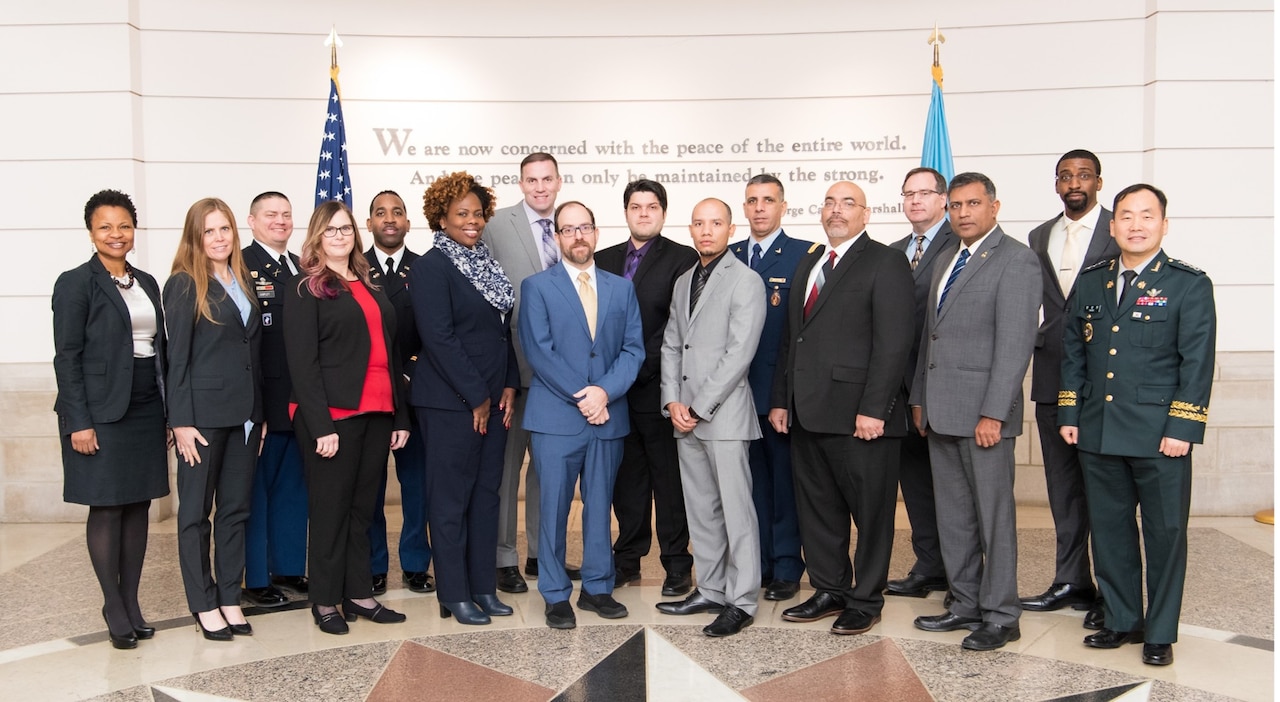April 10, 2020 | BY C. Todd Lopez , DOD News
As the coronavirus pandemic disrupts everything from church
services to basic training, the latest cohort of students in the Chief
Information Officer Leadership Development Program at the National Defense
University still held its graduation ceremony — online.
It's both a first and a last for the course, as the program
is being discontinued after a 30-year run.
"The NDU is a second-to-none institution when it comes
to those of us who are interested in the national security of our great
nation," Dana Deasy, the Defense Department's chief information officer,
said in his remarks to the graduates today. "Each and every one of you
should be proud that you have completed the CIO Leadership Development Program
at NDU."
This year, 15 students, including civilians from across the
federal government as well as military personnel from two partner nations
graduated from the course. The graduation ceremony and the last weeks of their
course were conducted online as a result of social-distancing requirements
related to stemming the spread of COVID-19.
Deasy said it's fitting that information technology
prevented COVID-19 from being able to disrupt the advancement of students
through the remainder of the CIO leadership course or to their graduation. The
same is being seen elsewhere in the nation, he added, as technology has enabled
a resilience that would not have been possible just 40 years ago.
"I cannot help but wonder what a pandemic of this scale
would look like if the year was 1980," Deasy said. "Nearly everything
would have been grounded to a halt if everyone were at home. [Yet] tens of
millions of jobs across all major industry sectors are still being performed
today because we have the tech-enabled connectivity to continue to work and
create value."
That same kind of technology advancement has also increased
capability in support of the nation's defense, Deasy said.
"Information technology has also risen to the occasion
to enable the nation to perform critical missions in many areas, including
national security," he said. "Despite COVID-19, the department
remains ready and able to execute critical missions. Every day I see how access
to information and our technological capabilities is an enduring source of U.S.
military strength and critical to survival on the future battlefield."
The students graduating today will be at the forefront of
leading continued advancement in information technology in the coming years,
Deasy said.
"Everyone here today is serving their country in some
capacity," he added, "and I want to take this opportunity to thank
you for your past and future service, where you will continue to provide your
dedication to the mission."
Dr. Cassandra C. Lewis, the acting chancellor of the College
of Information and Cyberspace, which hosts the CIO Leadership Development
Program at NDU, said the program has had great effect on the Defense Department
and the federal workforce.
A circular logo shows a spearhead over the top of a purple
shield. Atop the shield is an oil lamp and a wreath. Words around the shield
say “College of Information and Cyberspace -- National Defense University.”
"For three decades, the CIO LDP has been our nation's
flagship program for rising senior leaders and managers working to achieve
national and international security goals through the use of information and
information technology," Lewis said. "This prestigious program has
served countless standout leaders, both within the federal government as well
as our partners and allies."
More than 1,500 students have graduated from the 14-week
program since it began in 1990. The program is targeted at senior-level
managers and leaders responsible for promoting and attaining national and
international security goals through the strategic use of information and
information technology. The program provides participants with the chief
information officer certificate, a diploma, and course work applicable toward a
master of science degree in government information leadership.
"Over 14 short weeks, [students] have completed six
courses, they met with ... leaders inside the Beltway, [and] participated in a
pretty rigorous and engaging domestic field study experience all to gain
first-hand knowledge about how public and private senior leaders are advancing
CIO competencies and leading in this complex environment," Lewis said.
This graduation was the last scheduled iteration of the CIO
LDP, and the College of Information and Cyberspace is also slated for
elimination within the next two years as part of a transformation effort at the
NDU.
The College of Information and Cyberspace, or CIC, was
established in 1964 as the Department of Defense Computer Institute, or DODCI.
In 1988 the school transitioned to the Information Resources Management
College, also called the "iCollege." In 2016, it became CIC. Early
on, Navy Adm. Grace Hopper was an instructor at the school.
"One thing that has remained consistent throughout all
of those evolutions [is the] steadfast, fierce determination of our faculty and
staff, and their commitment to bring innovation into the classroom [and] to
advance through their thought leadership, information, cybersecurity, emerging
technology and cyberspace," Lewis said. "They've also been steadfast
in their commitment to prepare senior military and government leaders to lead
and meet the challenges that we know they are bound to face in this
ever-evolving world."









No comments:
Post a Comment